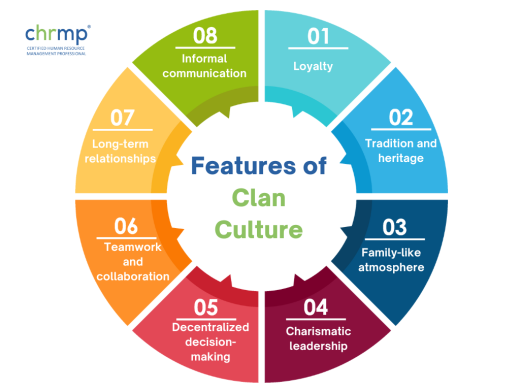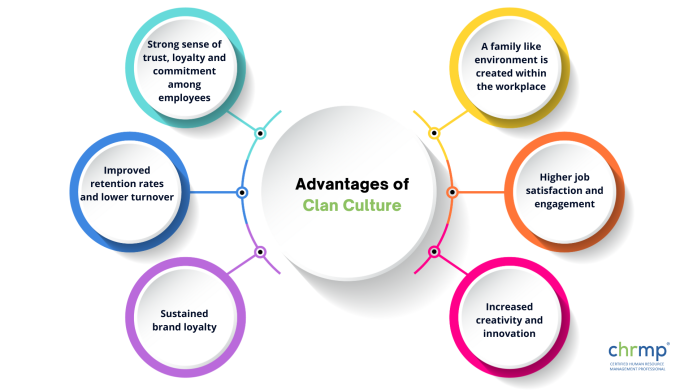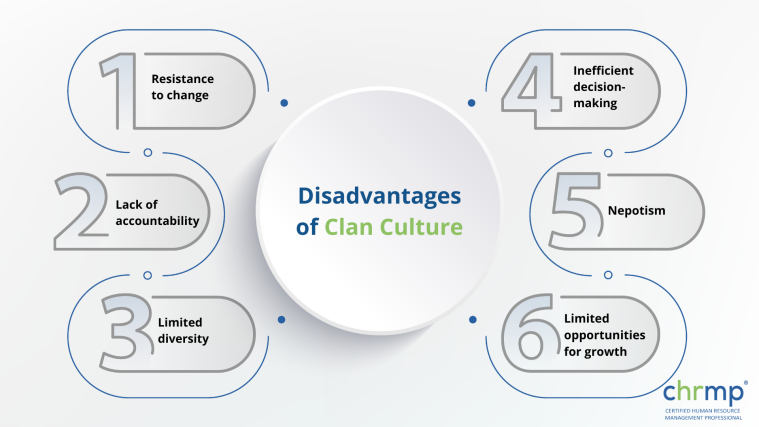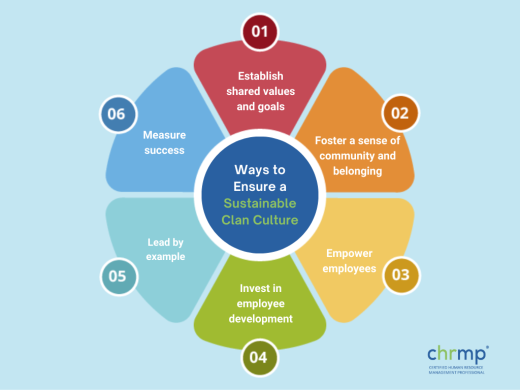

The term ‘clan culture’ is used to refer to a kind of organisational culture that is commonly seen in small to medium-sized companies and businesses owned by families. It is characterised by a firm sense of trust and loyalty and heavily focuses on tradition and heritage. In this blog , we shall discuss the various aspects of clan culture, including its advantages, disadvantages and how its elements can be incorporated into modern HRM practices.
So whether you are an HR professional looking to adapt the features of this type of work culture into your own company or someone just looking for ways to incorporate something different than traditional HR practices, this blog is for you.
So, let’slet’s dive right in and explore the fascinating world of clan culture!
Clan culture is a term used to describe a type of organisational culture typically found in small, medium-sized, or family-owned businesses. It is characterised by a great emphasis on trust, loyalty, tradition, heritage and a sense of familial relations among employees.
However, this organisational culture can also be seen in larger companies with a strong sense of community and shared values among employees.
The business leader is often viewed as a mentor or paternal figure, and all the employees are regarded as family members of the company.
This organisational culture fosters long-term relationships with all those involved, including employees, customers and suppliers. The power of decision-making is often not focused at the centre but is decentralised, and individual employees and teams enjoy a high degree of autonomy.
Clan culture also emphasises working together as a team and collaboration. It is a significant belief that the company’scompany’s success depends significantly on the group’s success.
Here are some key features of clan culture:

1. Loyalty:
Loyalty is a significant feature of this type of organisational culture. A sense of loyalty and trust binds all the employees in the company, and everyone is collectively committed to the organisation.
2.Tradition and heritage:
Clan culture greatly emphasises valuing tradition and heritage, and every employee is expected to be respectful and uphold company values and beliefs.
3. Family-like atmosphere:
This type of organisational culture fosters a family-like atmosphere within the company. All the employees are regarded as family members, and there is a strong sense of support and community.
4. Charismatic leadership:
In a clan culture, the leader is often a charismatic figure who embodies the values and beliefs of the organisation. The leader is seen as a mentor or even a parental figure to employees.
5. Decentralised decision-making:
Decision-making is often decentralised in a clan culture, with individual employees or teams given high autonomy.
6. Teamwork and collaboration:
There is a strong emphasis on teamwork and collaboration in a clan culture. The organisation’s success is seen as dependent on the team’s success.
7. Long-term relationships:
Clan culture values long-term relationships with employees, customers, and suppliers.
8. Informal communication:
Communication within a clan culture is often informal, focusing on building personal relationships between employees.
A clan culture values loyalty, tradition, and community and creates a supportive and family-like atmosphere within the organisation. It is often found in small to medium-sized and family-owned businesses but can also exist in larger organisations with a strong sense of community among employees.
The advantage of this organisational culture is the strong sense of trust, loyalty and commitment among employees. A clan culture makes employees feel like they are valued members of a close-knit community. This makes them more committed to the company’s success.

Informal and personal communication systems are preferred in clan cultures because teamwork, mutual understanding and collaboration are fostered better in such circumstances. A family-like environment is created within the workplace set-up, which can be very supportive and lead to higher job satisfaction and employee engagement.
When employees feel like they are part of a supportive community, they are more likely to be motivated and engaged, which in turn fuels creativity and innovation. But according to the data available, clan cultures can resist change.
Clan cultures value long-term relationships with customers and suppliers. This can lead to stronger relationships and more loyal customers and suppliers. Sustained brand loyalty is built in this manner over a while.
When employees feel like they are part of a close-knit community, they are more likely to stay with the organisation long-term. This can lead to improved retention rates, lower turnover, and low absenteeism.
Clan cultures create a cohesive and committed organisation with strong relationships among employees, customers, and suppliers. It can also lead to higher job satisfaction, improved retention rates and brand loyalty.
While clan culture has its advantages, there are also some disadvantages to consider, including:

1. Resistance to change:
More often than not, the traditions and values of the organisation can become very rigid over a prolonged period, and this type of organisational culture can be resistant to change. Employees are wary of disrupting the traditions and values of the organisation.
2. Lack of accountability:
In this type of organisational culture, where decision-making is decentralised, there’s often a lack of accountability as it becomes difficult to identify who is responsible for certain decisions or actions.
3. Limited diversity:
The focus of this type of organisational culture is often tradition and heritage. This can limit diversity within the organisation, regarding the backgrounds and perspectives of employees and the products or services offered.
4. Inefficient decision-making:
Without clear lines of authority, making decisions quickly and efficiently would not be easy. However, decentralisation can lead to an elevated state of autonomy and creativity among the organization’sorganization’s management, leading to inefficient decision-making.
5. Nepotism:
This type of organisational culture often promotes nepotism, as family members or close friends of the leader may be given preferential treatment over other employees regarding bonuses or compensatory benefits.
6. Limited growth opportunities:
In this type of organisational culture, there may be limited opportunities for growth or advancement, particularly for employees who are not part of the leader’s inner circle.
Clan culture can create a strong sense of community and commitment among employees, management, and brand loyalties where customers are concerned. Still, it can also lead to resistance to change, limited diversity, and inefficient decision-making. It is essential to consider both the advantages and disadvantages of clan culture when evaluating its suitability and sustainability for an organisation.
Incorporating the positive elements of clan culture in modern HRM involves:
By implementing these elements of clan culture in HRM practices, organisations can create a positive and supportive work environment that fosters loyalty, commitment, improved engagement, motivation and creativity among employees.
To ensure a sustainable clan culture in your organisation, you can take the following steps:

1. Establish shared values and goals:
Clearly define the shared values and goals of your organisation, and communicate them to your employees. Encourage employees to align their personal values with those of the organisation and make sure that everyone understands the role they play in achieving the company’s-company’s goals.
2. Foster a sense of community and belonging:
Create opportunities for employees to connect and build relationships with one another, such as through team-building activities, company events, and mentorship programs. Encourage open communication and collaboration, and ensure employees feel valued and supported.
3. Empower employees:
Provide employees with the tools, resources, and autonomy they need to do their jobs effectively. Encourage employees to take ownership of their work and contribute to the company’s success.
4. Invest in employee development:
Offer training and development programs that help employees build their skills and advance their careers. Encourage employees to take on new challenges, pursue their passions, and provide opportunities for growth and advancement within the company.
5.Lead by example:
Model the behaviours and attitudes that you want to see in your employees. Be open, transparent, and communicative, and demonstrate a commitment to the shared values and goals of the organisation.
6.Measure success:
Regularly assess the success of your clan culture initiatives using metrics such as employee satisfaction, productivity, and retention rates. Use this feedback to refine your approach and improve your organisational culture.
By following these steps, you can create a sustainable clan culture in your organisation that fosters a sense of community, empowers employees, and drives success.
Clan culture can be an effective organisational culture for many companies, particularly those that prioritise employee development and well-being.
However, organisations should carefully consider the pros and cons of clan culture and determine whether it is the right fit for their specific needs and goals.
By implementing elements of clan culture in modern HRM practices, organisations can create a positive and supportive work environment that fosters creativity, innovation, growth, commitment and loyalty for both employees and the company management towards each other and the organisation as a whole.
CHRMP (Certified Human Resource Management Professional) is a leading HR institution that provides world-class HR certification courses. Whether you’re you’re a seasoned HR professional looking to expand your skill set or a beginner in the HR world, we have the perfect course for each of you. Enrol with CHRMP today, and watch your career take off!
1. What is clan culture in the workplace?
Clan culture is an organisational culture that emphasises a sense of community and family within the workplace. It is characterised by high employee involvement, informal communication, and a focus on employee development and well-being.
2.What are some advantages of clan culture in the workplace?
Advantages of clan culture in the workplace include increased loyalty and commitment, improved communication, higher job satisfaction, increased creativity and innovation, stronger relationships with customers and suppliers, and improved retention rates.
3. What are some disadvantages of clan culture in the workplace?
Disadvantages of clan culture in the workplace include resistance to change, lack of accountability, limited diversity, inefficient decision-making, nepotism, and limited growth opportunities.
4. How can an organisation implement clan culture?
An organisation can implement clan culture by fostering a sense of community and collaboration among employees, encouraging open communication and informal relationships, providing opportunities for employee development, incorporating company traditions and values, recognising and rewarding employee contributions, creating a supportive work environment, encouraging autonomy and decentralised decision-making, and developing a solid leadership team.
5.How does clan culture differ from other types of organisational culture?
Clan culture differs from other types of organisational culture in that it emphasises a sense of community and family within the workplace. It is characterised by a focus on employee development and well-being, informal communication, and high levels of employee involvement. Other types of organisational culture, such as market culture, hierarchy culture, and adhocracy culture, may emphasise other values, such as competitiveness, control, and innovation, respectively.
© 2007-2025 CHRMP| All Rights Reserved | Powered by Ripples Learning & Research Private Limited
